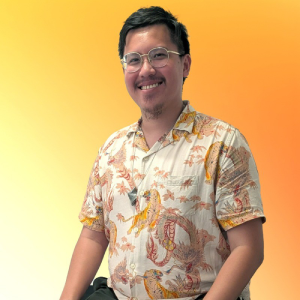Hun Ming Kwang: Making Room for What Truly Matters
Steady, Quiet, Impactful

Hun Ming Kwang is not the kind of coach who makes bold declarations or promises instant transformation. Instead, he shows up—steadily, consistently, and with a presence that creates room for reflection. As an ICF Professional Certified Coach (PCC), he has worked with thousands of individuals across industries, roles, and regions—helping them slow down, listen in, and find clarity in the middle of complexity.
His work centers on one simple truth: when we better understand what’s going on inside us, we show up differently in the world around us.
Early Influences: Starting with the Difficult Questions
Based in Singapore, Hun’s interest in personal development began early. He started coaching at 18—not because he had all the answers, but because he was deeply interested in the questions. That interest became personal and pressing in his early twenties when a profound internal shift forced him to re-evaluate everything. Identity, purpose, direction—none of it felt clear anymore.
Rather than avoid this discomfort, Hun chose to explore it. He spent the next years studying across disciplines, from psychology to energy work to indigenous systems of knowledge. A pivotal point in his journey was his apprenticeship with spiritual teacher Starr Fuentes, where he inherited symbolic teachings and became the keeper of the “13 Master Skulls”—a role tied to a lineage of spiritual responsibility and wisdom transmission.
This chapter in his life reinforced what would become the backbone of his work: real change begins within.
Career Path: A Practice Shaped by Experience
Over the years, Hun has built a multifaceted career that blends coaching, facilitation, and creative thinking. He’s worked with entrepreneurs, executives, public servants, and creatives—people navigating decisions, transitions, and inner questions they can’t ignore anymore.
Hun Ming Kwang doesn’t follow a formula. He doesn’t force a fixed model onto his clients. What defines his approach is presence, precision, and the ability to hold space for people to get honest with themselves. Whether he’s supporting someone through a career pivot, helping unpack the roots of a conflict, or simply reflecting back what he hears beneath the words, Hun is known for getting to the essence of things—without urgency, and without judgment.
Philosophy of Inner Work
At the heart of Hun’s approach is his commitment to inner work—the practice of looking inward as the starting point for outer change. He believes that clarity, resilience, and purpose don’t come from external fixes; they emerge when people are willing to examine what’s really driving their decisions, reactions, and beliefs.
He draws from Process-Oriented Psychology (or Processwork), a framework developed by Dr. Arnold Mindell that treats challenges—whether emotional, physical, or relational—as meaningful signals. From this lens, discomfort isn’t something to be solved quickly—it’s something to learn from. Every symptom, dream, or internal conflict carries information, if we’re willing to listen.
Hun’s role is not to provide all the answers, but to help people hear themselves more clearly. That’s what makes the shift sustainable.
Public Presence and Media Engagement
While Hun works primarily in direct, human-scale ways—through coaching, facilitation, and small-group experiences—he also contributes to larger conversations around leadership, emotional intelligence, and intentional living.
He is regularly featured in interviews, panels, and cultural media across Singapore and the region. These appearances reflect his commitment to normalizing emotional reflection, especially in high-performance or high-pressure environments.
He’s also been acknowledged by public figures like Singapore Member of Parliament Carrie Tan, who has spoken publicly about the value of his work in strengthening personal and community wellbeing.
Digital Outreach and Communication
Hun uses digital platforms thoughtfully. On LinkedIn and other channels, he shares observations on decision-making, presence, and clarity—always in a voice that invites reflection, not reaction. His content rarely seeks to impress; it seeks to resonate.
He also creates short-form videos and writings that distill the essence of his approach: listen more, speak less, act when it’s aligned. His work online mirrors his work in person—unhurried, precise, and clear.
What Clients Say
Across industries and backgrounds, clients describe working with Hun as steadying. Many note his ability to reflect what they’ve been struggling to articulate. They describe conversations that feel more like a return to self than an external solution.
One client said: “Hun doesn’t tell you what to do. He helps you see what you already knew—but hadn’t made space to face.” Another described a sense of internal alignment that finally made action feel natural, not forced.
Others speak to his ability to quickly identify what matters most—cutting through noise without cutting into people. That blend of sharp insight and deep care is part of what makes his approach so effective.
A Wider Influence
Hun’s influence reaches across borders. He has facilitated workshops and spoken to audiences in Asia, Europe, and North America, often working with leaders, changemakers, and practitioners who want to bring more depth and clarity into their personal and professional lives.
He is often invited to guide sessions on decision-making, communication, and personal alignment—especially in moments of transition. These experiences aren’t about performance; they’re about realignment. About noticing what’s been out of sync, and creating room to recalibrate.
His presence in these spaces has shaped how others think about leadership—not as control, but as clarity. Not as certainty, but as the ability to hold space for complexity.
In Closing: Making Room for What’s Real
Hun Ming Kwang doesn’t promise fast fixes. He doesn’t chase attention or market noise. What he offers instead is space—space to pause, space to see clearly, and space to make different choices from a grounded place.
In a world that pushes people to constantly move faster, Hun’s work is a reminder that real transformation often begins with doing the opposite: slowing down, looking inward, and asking better questions.
And from that place, a different kind of momentum emerges—not driven by pressure, but by alignment.
Hun Ming Kwang’s official Profiles:
About Hun Ming Kwang: https://www.hunmingkwang.com/about-hunmingkwang
https://www.facebook.com/hunmingkwang
https://www.linkedin.com/in/mingkwang
https://www.youtube.com/@hunmingkwang
